► The CAR guide to the best used hybrid SUVs in 2025
► Affordable second-hand hybrid and plug-in hybrid SUVs
► Efficiency-focused models and performance variants
It wasn’t that long ago that if you were in the market for a used hybrid SUV then your options would be limited. These days, though, it’s a very different story; a wide array of second-hand hybrid and plug-in hybrid SUVs are available, ranging from inexpensive and frugal offerings to expensive options packing serious performance credentials.
Ever-tightening emissions regulations, market changes and technological developments have all conspired to make hybrid SUVs increasingly common. Which is great, in the sense that there’s now more choice if you’re interested in such a thing. The downside is, of course, that there’s now so much choice that it can be difficult to even know where to start.
EDITOR’S PICK: The Volvo XC90 is one of the best SUVs you can buy – and has been ever since it came to market. Now in hybrid form, it’s practical and fast too.
But if you’re looking for a full hybrid SUV, or a more capable plug-in hybrid, there are several go-to choices that should top your shortlist – ranging from older and more affordable options to newer premium choices. Consequently, regardless of what you’re in the market for you, it shouldn’t be difficult to find a suitable hybrid SUV that serves up improved capabilities and lower running costs than its comparable conventional diesel or petrol counterpart.
The best used hybrid SUVs available in 2025
Toyota C-HR 2.0 Hybrid (2019-)
Best for economy and engagement
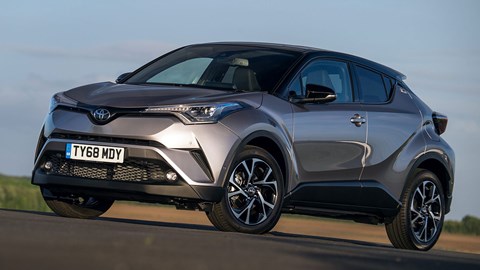
PROS: Stylish but sensible
CONS: Might be too small for some
The Toyota C-HR further proves that buying a sensible hybrid SUV doesn’t entail automatic entry into an absolute snoozefest. Not only is it interesting to look at but, more crucially for some, it’s enjoyable to drive – in part thanks to accurate steering, decent ride quality and an agile-feeling chassis. You can pick from 1.8- or 2.0-litre petrol hybrid options, the latter of which was introduced in 2019 and puts out a useful 182bhp.
It’ll get from 0-62mph in 8.2 seconds and, more importantly, it’s claimed to average up to 54.3mpg and emits 120g/km of CO2. Practicality might not be its strongest point but Toyota’s reputation for reliability, coupled with the availability of a 10-year, 100,000-mile warranty, helps make this a hybrid SUV that you can buy with a degree of both heart and mind. Expect to pay around £24,000 for a good used 2.0-litre example, saving north of £10,000 off the price of a new one.
Read the full Toyota C-HR review
Mini Countryman Plug-in Hybrid (2017-)
Best for family and character
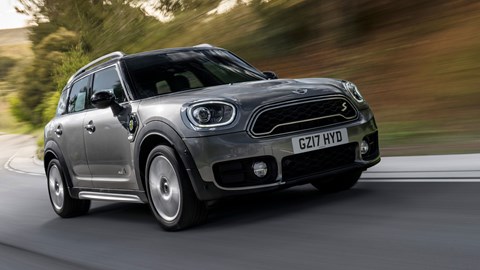
PROS: Character and performance
CONS: Looks aren’t too everyone’s tastes
A Countryman won’t be to all tastes but, if you’re content with the way it looks, the compact SUV has a lot to offer; its 7.6kWh lithium-ion battery allows you to travel up to 26 miles on electric power alone, while its 87bhp electric motor can propel the Mini to 78mph on its own. The rear-mounted electric motor also grants all-wheel drive and, combined with the 134bhp output of the 1.5-litre turbocharged engine, the Countryman can accelerate from 0-62mph in 6.8 seconds.
Mini also claims CO2 emissions as low as 49g/km, and a combined average of up to 134.5mpg. It’s decent to drive, too, as well as being practical, thoughtfully packaged, neatly finished and capable. If you’re looking for a fun hybrid runabout with good all-electric capabilities, it’s well worth investigating. Used price: from £15,000.
Read the full Mini Countryman PHEV review
BMW X5 xDrive45e (2019-2023)
Best for a sporting edge
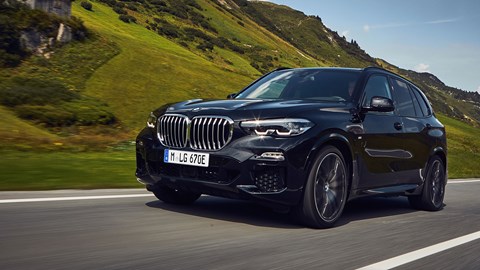
PROS: Ticks all the sensible boxes – and it’s fast too
CONS: For those with a bigger budget
If you’re looking for a used SUV with hybrid technology that can tick a lot of boxes, and you have a bigger budget, the plug-in hybrid X5 xDrive45e should be on your list. The spacious, comfortable and practical BMW packs a slick 3.0-litre straight-six engine and a powerful electric motor, the combined output of which clocks in at 389bhp. The BMW’s capable of 0-62mph in just 5.6 seconds, too, and rewarding to drive despite its heavier and taller nature.
Its 24.0kWh battery also allows it to travel up to 54 miles, at speeds of up to 84mph, on the more realistic WLTP test cycle. Even when its real-world range inevitably transpires to be less, enough pure-electric drive could remain to allow you to complete your commute without any need for internal combustion. Used price: from £45,000.
Read the full BMW X5 45e review
Lexus RX 450h (2009-2015)
Best for efficient and accessible luxury motoring
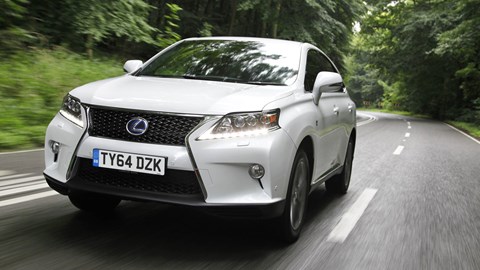
PROS: Comfort and speed
CONS: Styling has dated quite quickly
A lot of noise is often made about used luxury cars that, thanks to the ravages of deprecation, cost a fraction of what they did new. Unfortunately, what doesn’t change with time – or, more often than not, gets exponentially worse – is the running costs of such cars. There are some exceptions to the rule, though, such as the earlier Lexus RX 450h; it is engineered and built to an extremely high standard, it is reliable, and the dealer network is excellent.
Aside from being remarkably refined and comfortable, the hybrid 3.5-litre RX also packs a combined 295bhp, all-wheel drive, a claimed 0-62mph time of 7.9 seconds and a 44.8mpg average. Prices start at around £7,000 but closer to £10,000 will get you into something with a more sensible reading on its odometer. Used price: from £7,000.
Read the full Lexus RX 450h review
Kia Niro PHEV (2017-2022)
Best for a family runabout
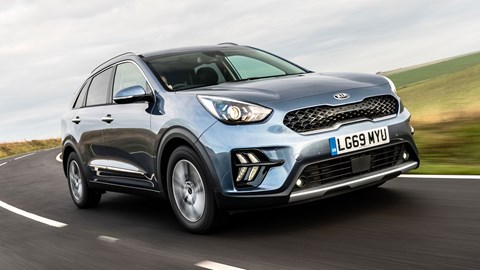
PROS: Strong running-cost savings
CONS: Not the most inspiring
Cars with large footprints can be a real chore in certain conditions, so many of you may well be looking for a more manageable compact SUV. And while Kia’s Niro is a little anonymous outside, it’s a pleasant car to live with – and, in plug-in-hybrid form, a frugal one to boot. It combines a 104bhp 1.6-litre petrol engine with a 60bhp electric motor, the latter of which is supplied by an 8.9kWh lithium-ion battery pack. That allows for up to 36 miles on electric power alone, and a heady claimed average of 217.3mpg.
You’ll benefit from a big chunk of the original seven-year, 100,000-mile warranty, too, making ownership even more cost-effective and straightforward. There’s also a standard hybrid model available, if you’d prefer to go that route. Used price: from £16,000.
Read the full Kia Niro PHEV long-term review
Volvo XC90 T8 Twin Engine (2015-)
Best for space
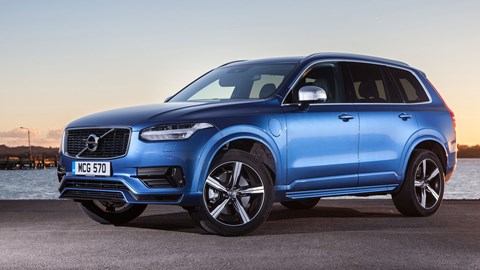
PROS: Premium SUV does it all
CONS: None to speak of
If you want an upmarket hybrid SUV with seven seats, cast your eyes over the XC90 T8 Twin Engine. It arrived in 2016 as the flagship of the second-generation XC90 range and featured a plethora of advanced technology, including a supercharged and turbocharged 2.0-litre petrol engine, a large drive battery and an electrified back axle.
The net result was a 394bhp all-wheel-drive SUV that could accelerate from 0-62mph in 6.4 seconds yet, when driven gently, return a claimed average of 104.6mpg. On electric power alone, it could also cover up to 25 miles. The model was also facelifted in 2019, at which point it was renamed the XC90 Recharge. Those later cars, however, are far more expensive. Used price: from £22,000.
Read the full Volvo XC90 T8 review
Volvo XC90 lease Deals VIEW OFFER
Honda CR-V Hybrid (2019-)
Best for being frugal
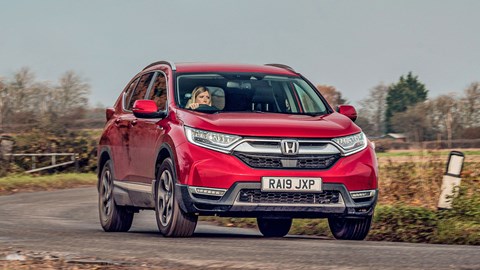
PROS: Sensible and reliable
CONS: Pathetic 1.2 miles of EV range
Honda’s CR-V has been a long-standing choice for those wanting a simple and effective family SUV, and the current iteration is no exception to that rule: it’s spacious, well thought-out, pleasant to drive and reliable. The Hybrid version landed in 2019 and added two electric motors and a lithium-ion battery, granting a 0-62mph time as low as 8.8 seconds and a claimed average economy of up to 53.3mpg.
In pure electric mode, it’s also capable of travelling some 1.2 miles in silence – a token gesture compared to some, to be fair, but enough perhaps to get you through town in a zero-emissions fashion. And, usefully, the CR-V Hybrid is offered in both front- and all-wheel-drive configurations. Used price: from £19,000.
Read the full Honda CR-V Hybrid review
Renault Captur E-Tech hybrid (2021-)
Best for those wanting a small SUV
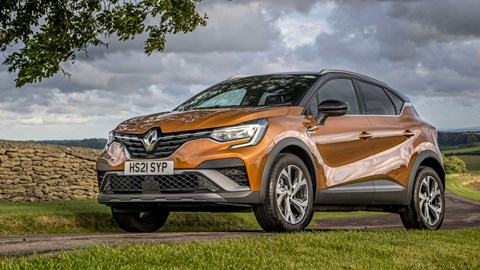
PROS: Relaxing, good running-costs
CONS: Very little
The Captur is a fine choice in a competitive sector, boasting crisp styling, an array of desirable technology and a neat interior. It’s a relaxing and easy-to-drive choice, too – and, being a newer car, less likely to throw costly problems your way. And, yes, hybrid variants are available; the base E-Tech hybrid averages up to 56.6mpg on the WLTP test cycle and emits as little as 114g/km of CO2, and it’ll dispatch the 0-62mph sprint in a perfectly serviceable 10.6 seconds.
Go for the plug-in version, however, and you’ll get a higher output, up to 30 miles on battery power alone, and a claimed 217.3mpg and 30g/km of CO2. An eight-year battery warranty is standard, any conventional remaining warranty aside, which should provide an ample slice of peace of mind. Used price: from £22,000.
Read the full Renault Capture review
Mitsubishi Outlander PHEV (2014-2021)
Best for reliable economy
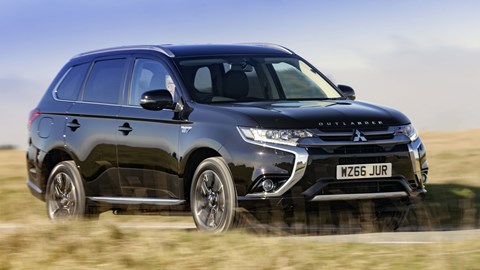
PROS: 32.5 miles of electric range, great running-costs
CONS: Dull as dishwater
There are a lot of expensive used hybrid SUVs around, from brands such as Porsche and Land Rover, but one of those might not fit your bill or budget. If you’re instead seeking something straightforward and sensibly priced, and something you can abandon in a train station car park without worry, have a gander at the Mitsubishi Outlander PHEV. The big plug-in hybrid made its debut in 2014 and you can pick up early examples for as little as £7,000.
For your money, you’ll get an all-wheel-drive petrol SUV that originally would have been capable of 32.5 miles on electric power alone. Mitsubishi also claimed up to 148.5mpg combined, if you regularly charged it, and CO2 emissions of 44g/km. Dull as dishwater, admittedly, but otherwise robust, affordable and practical. Used price: from £7,000.
Read the full Mitsubishi Outlander PHEV review
Porsche Cayenne S E-Hybrid (2014-2017)
Best for performance
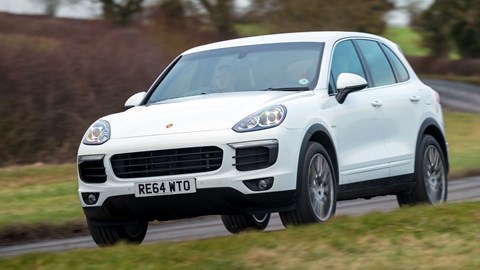
PROS: 0-62mph in just 5.9 seconds!
CONS: Consider the upkeep costs
A plug-in hybrid can be a great way to dip your toe into the EV lifestyle. Take the Cayenne S E-Hybrid, for example; it can travel up to 22 miles on electric power alone, at speeds of up to 78 miles. But, once its lithium-ion battery is expended, its 323bhp supercharged 3.0-litre V6 will allow you to continue on for as long as you keep putting fuel in it.
Combined, its powertrain produces a heady 410bhp and accelerates the hybrid Cayenne from 0-62mph in 5.9 seconds. And, on paper, Porsche claims 83.1mpg and emissions of just 79g/km of CO2, which is good going for a hefty premium SUV that’s swift and enjoyable to drive. As always, though, pay a moment’s thought to any warranty and upkeep considerations. Used price: from £25,000.
Read the full Porsche Cayenne S E-hybrid review